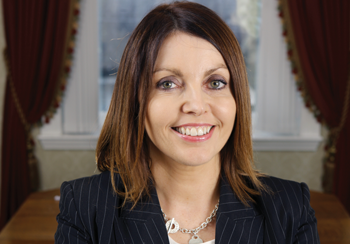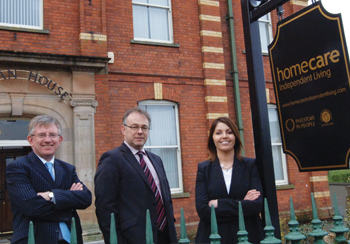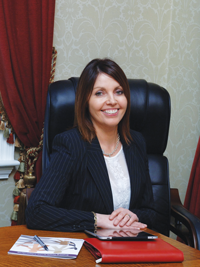Homecare: reshaping community care
 Homecare Independent Living’s Managing Director Mairead Mackle discusses its work and the challenges facing the Health Service in Northern Ireland with Peter Cheney and calls for a closer working relationship between the statutory and independent sectors in order to best deliver community care.
Homecare Independent Living’s Managing Director Mairead Mackle discusses its work and the challenges facing the Health Service in Northern Ireland with Peter Cheney and calls for a closer working relationship between the statutory and independent sectors in order to best deliver community care.
“We have firm views on how Homecare’s services can positively impact on our local communities,” according to Mairead Mackle who founded Homecare Independent Living along with her husband Gerald in 1995. Gerald is Executive Director and heads up the company’s housing division.
Mairead points out that “our business is all about enablng people to stay in their own home and using our skills to contribute to a better community. That is the ethos Homecare has held onto for the past 16 years and despite the company growth we have never lost sight of the family values it was built upon.”
She continues: “Working in the community care industry is not without its obstacles. With government budgetary constraints and a health and social care services review underway, the current challenge of delivering ‘more for less’ requires a fresh approach on how future services will be delivered. It needs new and innovative systems and solutions with a greater emphasis on prevention and delaying hospital admission and a focus on outcome measures and well-being.”
Planning
An ageing population will be one of Northern Ireland’s major challenges over the next 20 years. According to official projections, the number of people at pensionable age is to reach 432,000 in 2025 (up from 308,000 in 2010). This 40 per cent increase compares to an 8 per cent rise in the working age population. For the first time, our society will have more older people than children.
General Manager Bryan Meldrum explains: “Northern Ireland is already well advanced in its thinking on how technology can assist in the delivery of community care so we can build on that knowledge and create further workable solutions. Homecare is committed to connected health and is actively engaged with a number of partners and academic institutions to explore how care will be delivered in the future to meet the population’s needs. We are moving towards an electronic healthcare record and it is important to include all provider companies to ensure the record is as complete as possible. Homecare’s MIS [management information system] has the capacity to connect and share information with other systems.”
Mairead adds: “We are working with partners to create a ‘complete’ solution to give people choices about staying at home where possible for their care. Given that technology will play a huge part in the delivery of healthcare in the future we believe it’s the working together of both the professional and the practical side that will offer the real solution for people, especially for it to be done at scale.”
Gerald Mackle points out that it can be difficult for companies such as Homecare to budget, plan ahead and direct their resources in the right path. He says: “We invest a substantial amount of money each year to improve our services and with closer and earlier engagement, our investment decisions could be aligned better to the department’s planning. Therefore from our perspective, we would like to see providers like ourselves becoming closer to the Government’s strategic planning stage of care provision.” He believes that consultation and greater transparency are the key elements in co-operation between the public and private sectors.
Homecare provide services in each of the health and social care trusts in Northern Ireland. They have also expanded services to the Health Service Executive (HSE) in Southern Ireland which accounts for 40 per cent of its turnover. Over 1,000,000 hours of care were provided this year to more than 2,500 clients.
The company has invested over £2 million in technology, training and motor vehicles to enhance its services. Its head office is at Callan House, a restored listed building, in the village of Milford, County Armagh along with offices in Belfast, Magherafelt and Dundalk. It employs over 900 staff, a figure due to rise to over 1,000 by April 2012. In this financial year, its projected turnover will be an increase of 24 per cent on the previous year.
Financial viability is a necessity for any community provider organisation,” says Mairead. “It allows us not only to offer secure employment and stability within the service but also to continue to invest in new ways of delivering services to support people’s independence. It’s especially important now that commissioning keeps a fixed focus on quality and a long-term view of clients’ needs, as people will look to the department as a role model for good practice. Private providers like Homecare run an efficient and cost effective service but we also create inventive solutions through our research and creativity.”
The Homecare team provides services which positively impact on the major social issues including domiciliary care, housing, support services and nursing services.
Homecare’s Housing with Care model is unique due to the flexible and swift response of staff, offering a professional team with years of experience. Houses can be adapted if necessary to suit the needs of tenants and located in areas of need within walking distance of all amenities.
Gerald Mackle comments: "Homecare Housing offer ‘a home of your own’ supplying accommodation backed up by a team of floating support staff who can help our clients regain their independence in a variety of ways from budgeting, getting access to education and other services or just helping them to sustain their tenancies. These services are so vital particularly in today’s economic climate.
Our in-house building and maintenance teams can adapt a property to suit a client’s needs within a relatively short period of time, which can be a major benefit to people with disabilities.
Homecare’s ‘peripatetic service’ offers care, housing and support to people from a range of backgrounds, including those with complex mental health needs. A specialist social work led team in Belfast run this service.”
Bryan Meldrum points out that this is integrated care in practice, with assisted technology becoming the next arm of the service. “Our development of our nursing services further demonstrates the integrated care model and not only does Homecare support intensive domiciliary care but enables more continuing healthcare to be undertaken in the home,” he explains.
Quality of support
Mairead reflects: “Quality has always been our focus and as people are our most valuable asset, we achieved ‘Investors in People’ and ‘Excellence through people’ awards, as well as accreditation through RQIA [the Regulation and Quality Improvement Authority]. We constantly measure and benchmark our services through our partnerships with other companies across Ireland and in the UK.”
“Everything we do is process driven to improve both customer satisfaction and efficiency of our response. We set up a seven-day week ‘customer service centre’ based at our HQ in Milford,” she adds.
“Our strength is that we can complement the professional services in the Health Service in that, at any given time, where necessary we have the infrastructure on the ground enabling us to respond within a very short space of time.”
All staff go through training in NVQ L2 to L4 and fetac L5. The team also provides training to a number of outside companies. With the right environment, care can become a career for people.
Homecare’s offering is much more than a financial one. With its strong involvement in community and voluntary work, its approaches are non conventional.
Its charity committee, ICARE, draws its name from the company’s five values:
• Integrity;
• Commitment;
• Accountability;
• Respect; and
• Enthusiasm.
ICARE aims to “improve and help” the communities in which Homecare operates.
The 40-acre Manor House listed estate in Milford opens its 130 year old gate lodge as a Santa’s gate lodge for 16 days in December, and is manned by volunteers from Homecare and their families, students from local schools, members of local groups and residents. Altogether, over 200 volunteers welcome about 5,000 visitors from across Ireland.
Mairead comments: “This is a really special event that pulls so many people together from different backgrounds and all proceeds this year will go to the NSPCC in Craigavon and to the RVH via The Sophia Fund.
“Our proposed retirement village on this site is based on a model already used in the UK and will include a care home facility. A choice of care options will be available, from complete independence to daily assistance in housekeeping along with the provision of modern technology and an energy efficient housing design.”
In the light of the growing need for care, I asked Mairead whether society can face up to that task and what her company can contribute?
She points to the befriending service which Homecare plans to launch in the Armagh area next January. Volunteers will visit isolated older people and help them take up interests they have enjoyed in the past e.g. walks in the area, visits to parks or libraries, gardening and baking. To this end the ICARE committee has managed to secure funding from a cross-border health project, CAWT (Co-operation and Working Together).
Mairead believes that many years ago, such a service would not have been needed as people knew their neighbours and had “a house to visit every night of the week”. Her mother, growing up in rural Fermanagh, would have visited and chatted with older neighbours round the fire at night time but that way of life sadly is now gone. “My mother talks about how much she valued older people then and I’m hopeful that our new befriending service will recapture some of the goodwill and community spirit that was a thing of the past.”
As the population has aged, the public’s expectations from care have increased and Mairead agrees that the service should meet those expectations: “Obviously, we are working with a restricted budget but a restricted budget should not mean poor delivery of services. In a lot of cases the key is letting people know what’s possible and what’s not from the outset. Good relationships make all the difference and I believe it is how people are dealt with that’s vital; respect, understanding and good communication still go a long way. Also people need to have realistic choices and then they or their families can supplement those services if they so choose. Choice, access and quality of services should be there for people.
“Technology also has a part to play. Social networking sites such as Facebook can keep older people in touch with friends and relatives. On the medical side, for example, blood pressure readings or other monitoring devices in the home can help people take some responsibility for their own health.’
The future
Homecare is set to continue to grow and develop its range of services into the community.
Even with this continued growth, Homecare aims to combine the efficiencies of good business practice with the social needs of the community.
Mairead states: “Being both socially focused and commercially astute is something that Homecare has mastered and will continue to do so in the future.
“We are focused on caring for people and building a strong ethical business that is at the heart of the community it serves.”
Overview
Homecare’s main areas of work are domiciliary care, temporary and long-term housing, nursing and support services which help prepare people for independent living. Its wide range of clients include older people, families, patients recovering from surgery, people with addictions, single and young parents, and young people leaving care.







